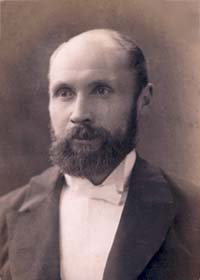
Charles Rasp
Encyclopedia

Broken Hill, New South Wales
-Geology:Broken Hill's massive orebody, which formed about 1,800 million years ago, has proved to be among the world's largest silver-lead-zinc mineral deposits. The orebody is shaped like a boomerang plunging into the earth at its ends and outcropping in the centre. The protruding tip of the...
, Australia.
He was born at Stuttgart
Stuttgart
Stuttgart is the capital of the state of Baden-Württemberg in southern Germany. The sixth-largest city in Germany, Stuttgart has a population of 600,038 while the metropolitan area has a population of 5.3 million ....
, Duchy of Württemberg, where he was educated and he was trained in chemistry. He emigrated to Australia
Australia
Australia , officially the Commonwealth of Australia, is a country in the Southern Hemisphere comprising the mainland of the Australian continent, the island of Tasmania, and numerous smaller islands in the Indian and Pacific Oceans. It is the world's sixth-largest country by total area...
to improve his health in 1869 and worked at a variety of jobs on rural stations, eventually ending up at the Mount Gipps station managed by George McCulloch, where he was employed as a boundary rider (Coulls, 1976 and Camilleri, 2006).
Inspired by the silver rush to nearby Silverton
Silverton, New South Wales
Silverton is a small village at the far west of New South Wales, Australia, 25 kilometres north-west of Broken Hill. At the 2006 census, Silverton had a population of 89 people....
, he began to prospect in the area of Broken Hill.
One day while mustering sheep in the Broken Hill paddock towards the end of September 1883, he was struck by the mineral appearance and formation of the 'Broken Hill'. He joined forces with local contractors David James and James Poole, and they took out a mining lease on part of Broken Hill and sank a small shaft. Though discouraged by early assay
Assay
An assay is a procedure in molecular biology for testing or measuring the activity of a drug or biochemical in an organism or organic sample. A quantitative assay may also measure the amount of a substance in a sample. Bioassays and immunoassays are among the many varieties of specialized...
results, they persisted and soon after were joined by four others (all working on Mount Gipps) forming the Syndicate of Seven
Syndicate of Seven
The Syndicate of Seven is the name given to the original members of the Broken Hill Mining Company formed in 1883, who lodged applications for mining leases along the Line of Lode at Broken Hill in New South Wales, Australia....
. George McCulloch and Charles Rasp pegged out further leases which took in the whole of Broken Hill, the original name of which was said to be Wilyu-Wilyu-yong (Curtis, 1908).
They were prospecting for tin
Tin
Tin is a chemical element with the symbol Sn and atomic number 50. It is a main group metal in group 14 of the periodic table. Tin shows chemical similarity to both neighboring group 14 elements, germanium and lead and has two possible oxidation states, +2 and the slightly more stable +4...
, but early assay results found only low grade lead
Lead
Lead is a main-group element in the carbon group with the symbol Pb and atomic number 82. Lead is a soft, malleable poor metal. It is also counted as one of the heavy metals. Metallic lead has a bluish-white color after being freshly cut, but it soon tarnishes to a dull grayish color when exposed...
ore and traces of silver (Curtis, 1908). It was not until late 1884 or early 1885 that rich quantities of silver were found and the Broken Hill Proprietary Company (BHP) was floated to mine the leases. Rasp received an allocation of shares and, within five years, he was rich (Coulls, 1976).
Rasp moved to Adelaide, married and dabbled in mining interests until his death in 1907.

